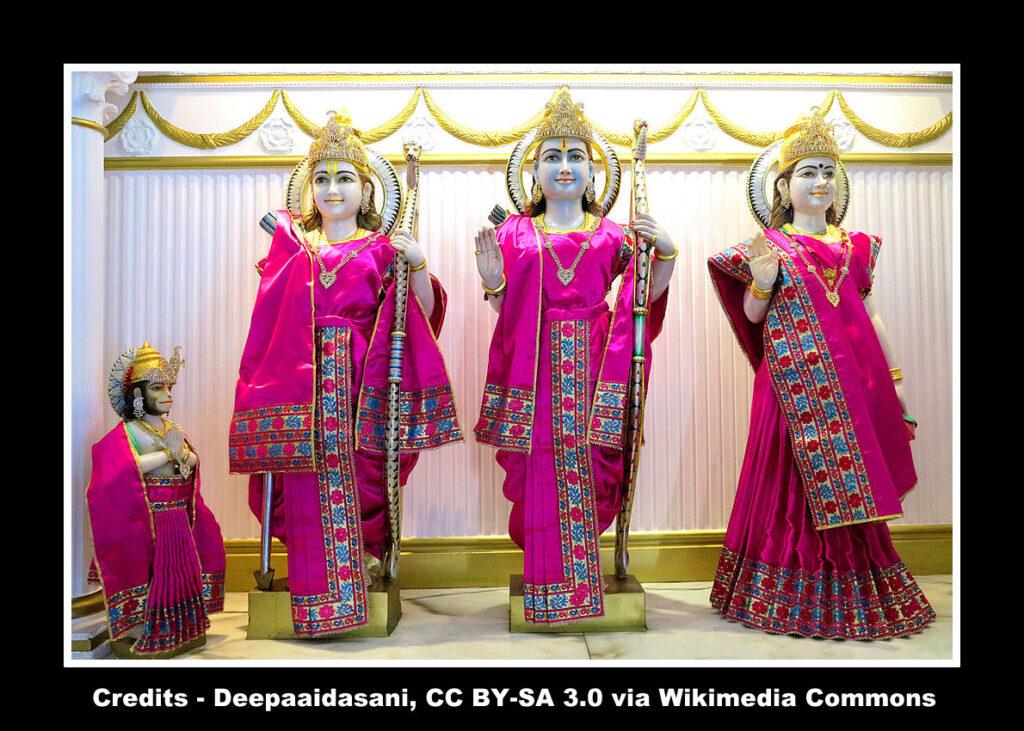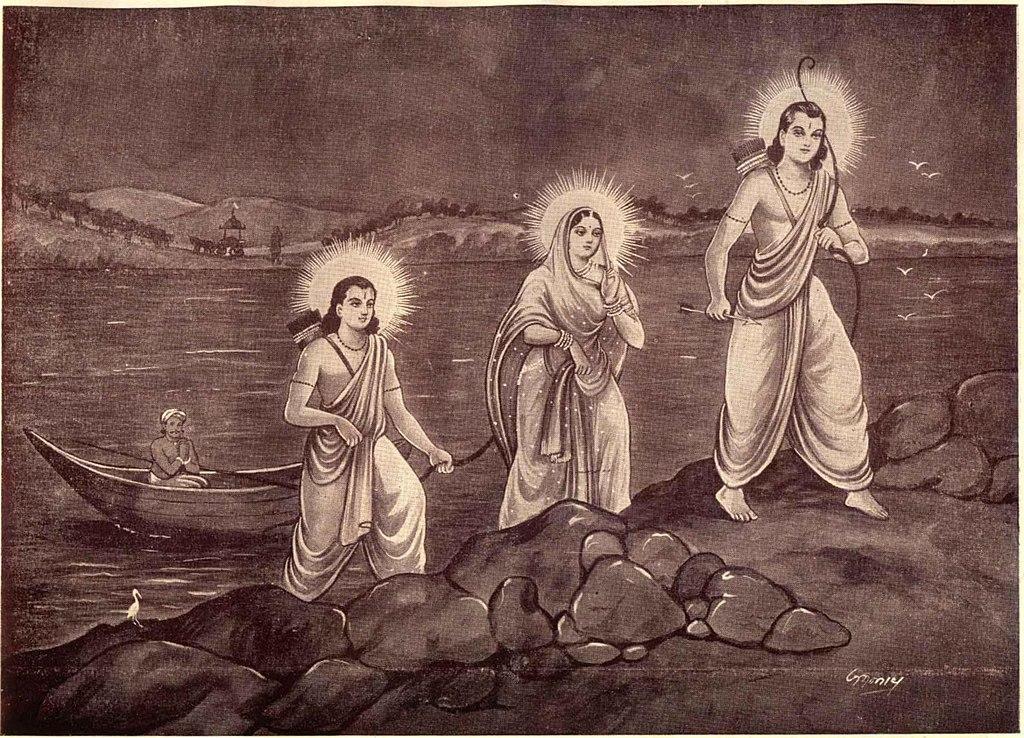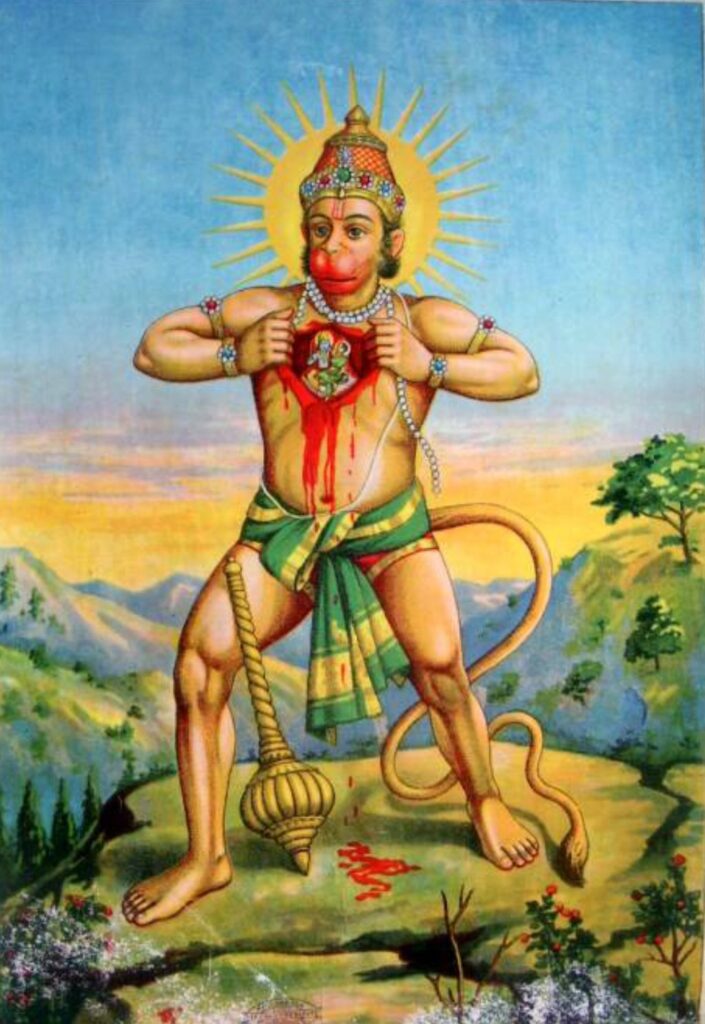 Lord Rama, an iconic figure of Hinduism and revered as the seventh avatar of Lord Vishnu, encapsulates a multitude of virtues and qualities that continue to inspire millions across generations. His life and teachings serve as a timeless source of guidance and enlightenment, highlighting the essence of righteousness, integrity, and unwavering devotion. Lord Rama’s unwavering commitment to upholding truth, his unyielding sense of duty, and his ability to maintain equanimity even in the face of adversity make him a symbol of moral excellence and an eternal role model. In this article, we delve into the extraordinary qualities of Lord Rama, drawing insights from the epic Ramayana, and exploring their relevance in today’s world.
Lord Rama, an iconic figure of Hinduism and revered as the seventh avatar of Lord Vishnu, encapsulates a multitude of virtues and qualities that continue to inspire millions across generations. His life and teachings serve as a timeless source of guidance and enlightenment, highlighting the essence of righteousness, integrity, and unwavering devotion. Lord Rama’s unwavering commitment to upholding truth, his unyielding sense of duty, and his ability to maintain equanimity even in the face of adversity make him a symbol of moral excellence and an eternal role model. In this article, we delve into the extraordinary qualities of Lord Rama, drawing insights from the epic Ramayana, and exploring their relevance in today’s world.
#1 Lord Rama, the Invincible
In a formidable display of invincibility, Lord Rama exhibited extraordinary prowess and unwavering valor during a momentous encounter with the demons dispatched by Khara, the leader of the rakshasas, who wanted to avenge the insult of his sister Surpanakha. As the demons stormed Rama’s hermitage with malicious intent, He fearlessly donned celestial weapons bestowed upon Him by sage Agastya. With lightning reflexes, Rama swiftly countered their onslaught, severing their darts and striking their hearts with lethal precision. His arrows shattered their weapons and bodies, leaving a trail of lifeless adversaries in his wake.

Undeterred by the formidable Trishira, a three-headed demon, Lord Rama engaged in a fierce battle, enduring a blow to his forehead that drew blood. However, Rama’s indomitable spirit prevailed as he unleashed fourteen serpent-like arrows, piercing through Trishira’s chest and claiming his life.
As the demigods and sages observed from the heavens, Rama remained resolute in the face of the demons’ relentless assault. Khara, consumed by desperation, charged at Rama, unleashing a barrage of arrows that shattered His armor. Fueled by righteous fury, Rama retaliated, launching six arrows that found their mark in Khara’s head, arms, and chest. Khara’s chariot, charioteer, horses, and armor were reduced to ruins, and in a climactic moment, Rama released an arrow infused with the celestial force of Indra’s thunderbolt. The arrow pierced Khara’s chest, obliterating him and putting an end to the malevolent curse that had plagued the region.
Through his unparalleled combat skills, unwavering determination, and divine might, Lord Rama emerged victorious, earning the profound admiration of demigods and sages. His triumph over the demons not only restored peace to the land but also served as an enduring testament to his invincibility and his role as the embodiment of righteousness and divine protection.
#2 The Ideal son
Lord Rama exemplifies the qualities of an ideal son, as portrayed in the scriptures. From His birth in Ayodhya, Lord Rama showed unwavering devotion to His father, King Dasaratha, and fulfilled his every wish. He excelled in various arts, mastering archery, horseback and elephant riding, and chariot driving. Lord Rama shared a deep bond with His brothers, Lakshmana, Bharata, and Shatrughna, supporting and protecting them. When sage Visvamitra sought Rama’s assistance in battling the demons, He fearlessly embarked on the mission, showcasing His impeccable skills and prowess. Rama’s humility, obedience, and readiness to fulfill His duty as a son shine through when He willingly accepted exile to the forest for fourteen years to honor His father’s vow. Even in the face of adversity, Rama’s love and respect for His parents, particularly His stepmother Kaikeyi, remained unwavering. Lord Rama’s unwavering commitment to family values and his selfless nature make Him an extraordinary exemplar of an ideal son.
#3 Rama, the ideal brother
Throughout Ramayana, Rama exemplified immense responsibility, especially as an elder brother, demonstrating deep love and care for his siblings. He treated Lakshmana as an equal, devoid of any dominance merely based on seniority. The sight of Lakshmana’s grave injuries in battle shattered Rama’s heart, compelling him to beseech Hanuman to spare no effort in saving his beloved brother’s life. The bond shared between Rama and Lakshmana stands as an unwavering pillar of brotherhood in ancient India’s history, embodying unwavering camaraderie. Rama’s character is devoid of envy or jealousy, celebrating his brothers’ achievements and successes with genuine joy. Even when Bharata ascends to the throne, Rama remains unperturbed, reflecting his exceptional magnanimity. These qualities engendered immense respect from his brothers, who revered him as an awe-inspiring figure. Rama not only entrusted the kingdom to his younger brother Bharata but also urged the people of Ayodhya to extend the same love and respect to Bharata as they had shown towards him. Rama’s actions showcased his profound commitment to familial harmony and the greater good, earning him the admiration and reverence of his brothers and the people alike.
#4 Ekpatni vratastha (monogynist)
Lord Rama is renowned for his quality of being a monogynist, strictly adhering to the principle of having only one wife. Despite being a Kshatriya and the beloved King, Rama could have easily accepted multiple queens according to the norms of the time. However, he remained steadfast in his vow to have only Sita as his one and only consort, rejecting any advances from other women. When the trio of Rama, Sita, and Lakshmana left Ayodhya in the middle of the night, they embarked on their journey into the forest, with Rama ensuring the fulfillment of his commitment to Sita.

The incident with the powerful Rakshasi Surpanakha exemplifies Rama’s monogynist quality. Surpanakha, attracted to Rama’s charm and appearance, expressed her desire to have him as her husband. However, Rama firmly declared that he was already married and devoted only to Sita. He playfully redirected Surpanakha’s attention towards Lakshmana, suggesting that she consider him as a potential husband. Lakshmana, understanding Rama’s jest, offered Surpanakha the humorous proposal of becoming Sita’s servant instead.
In this way, Rama’s commitment to monogamy remained unwavering. His declaration and actions demonstrated his unwavering devotion to Sita as his sole wife and his dedication to upholding the principle of having only one spouse. This quality of Lord Rama reflects his integrity, faithfulness, and the highest regard for his marital bond with Sita.
#5 The Ideal Friend
Lord Rama exemplifies the qualities of an ideal friend through his unwavering support, loyalty, and guidance to those who seek his friendship. Whether it was Sugriva, the monkey king, or Vibhishana, the demon prince, Rama consistently stood by their side, offering help and protection. He helped Sugriva reclaim his kingdom from Vali and embraced Vibhishana despite his demonic background, acknowledging his noble intentions. Rama’s friendship was selfless, genuine, and unconditional, demonstrating his compassion, trustworthiness, and fairness. His actions teach us the value of true friendship, where one is willing to go to great lengths to support, uplift, and stand by their friends in times of need.
#6 Lord Rama, the Grateful
Lord Rama’s behavior towards Jatayu demonstrates his gratitude and reverence for those who sacrifice themselves for his cause. Despite being mortally wounded while fighting against Ravana to rescue Sita, Jatayu provided crucial information to Rama about Sita’s abduction. Rama, accompanied by Lakshmana, performed the last rites for Jatayu, honoring his bravery and sacrifice. This act showcases Rama’s deep appreciation for Jatayu’s loyalty and selflessness. Rama’s gratitude is not only evident in his actions but also in his commitment to fulfill Jatayu’s dying wish by rescuing Sita and defeating Ravana. Through his behavior, Rama exemplifies the virtue of gratitude and the importance of acknowledging and repaying acts of kindness and loyalty.
#7 Lord Rama, the destroyer of Pride
Lord Rama is the destroyer of pride through his actions and teachings. His unwavering adherence to righteousness and humility serves as a powerful example. He defeats and humbles mighty warriors and demons, breaking their arrogance and sense of invincibility. Rama never boasts of his own accomplishments and always acknowledges the contributions of others. He shows compassion and forgiveness even to those who have wronged him. Rama’s selfless dedication to duty, his ability to put others before himself, and his embodiment of virtuous qualities dismantle pride and ego, inspiring individuals to let go of their inflated self-importance and embrace humility.

Lord Rama’s encounter with Parashurama exemplifies his role as the destroyer of pride. Parashurama, known for his immense power and pride, challenged Rama to prove his strength by stringing a more powerful bow. However, Rama effortlessly accomplished the task, demonstrating his superiority. Instead of using his arrow to harm Parashurama, Rama humbly offered to release it wherever the sage desired. This act humbled Parashurama, who recognized Rama as Lord Vishnu and acknowledged his own ego and desire for heavenly pleasures. Parashurama surrendered his pride and requested Rama to destroy it, allowing him to serve Rama eternally. Rama’s ability to dismantle Parashurama’s pride showcases his role as the destroyer of arrogance and his capacity to bring individuals to a state of humility and surrender.
#8 Lord Rama – the destroyer of evil
Lord Rama, as the destroyer of evil, engaged in epic battles against formidable opponents, annihilating them with unwavering determination. From Tataka to Khara, Maricha, and the mighty Ravana, none could escape their ultimate demise at the hands of Lord Rama. He fearlessly faced each evil force, upholding righteousness and protecting the innocent. With divine weapons and unparalleled skill, Rama vanquished countless demons, restoring harmony and justice to the world. His victory over Ravana, the epitome of evil, marked the culmination of his mission to exterminate malevolence and establish righteousness. Lord Rama’s triumph stands as an eternal testament to the power of good over evil.
#9 Lord Rama, the ideal King
Lord Rama, the ideal king, exemplified the highest qualities of leadership and governance. With unwavering commitment, he dedicated himself to the welfare and protection of his subjects. Rama prioritized the well-being and happiness of his people above personal desires and comforts. He adhered to the principles of justice, righteousness, and fairness in all his decisions, ensuring that the law was upheld and the innocent were protected. Rama’s integrity, wisdom, and selflessness made him an ideal ruler, revered by his kingdom. His exemplary conduct as a king continues to inspire leaders to fulfill their duty with utmost dedication and compassion.
During the reign of Lord Rama, known as Rama-Rajya, the kingdom experienced a profound transformation. Under his rule, the people were blessed with a state of unprecedented well-being, where all forms of mental and physical suffering vanished. Diseases had no hold, old age seemed distant, grief and fear were replaced with serenity, and weariness became unknown. The realm of Rama was marked by harmony and prosperity, and the citizens thrived under his just and compassionate leadership. Even death itself respected the will of the people, sparing those who did not wish for its arrival. The enduring memory of Rama-Rajya serves as a timeless reminder of Lord Rama’s example as an ideal king, inspiring generations to aspire for a just and benevolent rule.
#10 Rama – the loving Husband
Rama, the epitome of a loving husband, showcased his devotion and respect towards Sita throughout their journey. Despite initially trying to dissuade Sita from joining him in the forests due to the hardships they would face, Rama ultimately respected her decision and treated her as an equal partner. Their discussions were filled with calmness and understanding, devoid of ego or attitude. Rama ensured that Sita’s desires were fulfilled, going so far as to embark on a perilous quest to find the golden deer she desired, despite knowing the dangers it posed. When Sita was abducted by Ravana, Rama’s emotions overwhelmed him, leading him to gather resources and allies to rescue her, demonstrating his strength of character and unwavering commitment. Even when societal doubts arose about Sita’s chastity, Rama’s trust in her remained unshaken. Though circumstances forced him to send Sita into exile, his loyalty and love for her never wavered. Despite their physical separation, their souls remained intertwined in eternal love, and Rama remained dedicated solely to Sita.